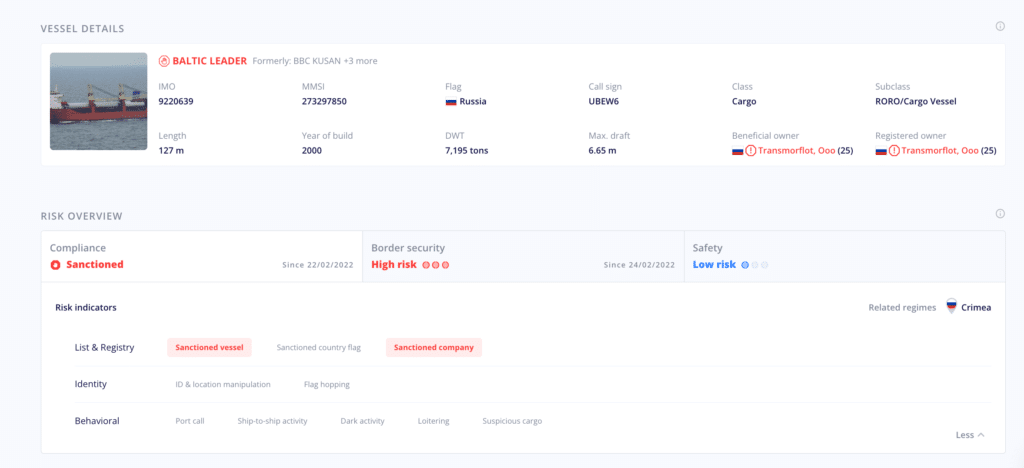What’s inside?
The ongoing conflict between Russia and Ukraine is threatening to change the global status quo and set the world back a few decades. With countries and governments still trying to recover from the pandemic, the economic impact could be very destructive; mainly depending on the conflict’s length and scope, and the extension of the sanctions imposed.
While it might take some time for all financial setbacks to come into effect, this new reality is already leaving quite a mark on the complex shipping industry.
The impact of potential sanctions on global trade
With military intervention off the table at this point, the West is resorting to sanctions as a means of trying to pressure Russia into ending the conflict. Financial institutions, investments in the Russian market, export of goods and access to EU financial markets have all been limited, cutting off Russia’s ability to transact, get credit and trade with the rest of the world.
Where do these sanctions meet us in the maritime domain? Let’s take a closer look at the shipping impacts of the conflict:
Trade finance
The aforementioned financial restrictions will make trade financing from Russia to the US or EU very difficult as they target approximately 80% of all Russian banking assets. By cutting off access to the US and European financial markets, Russian businesses will be unable to finance the majority of global deals as payment for those exports will be immediately rejected by US and European regulators.
The impact on trade finance from these new sanctions will be quite extensive. Sberbank, which accounts for half of Russian banking market share, conducted USD 39.6 billion in trade finance deals in 2019. Without access to the global financial system, this and other trade finance deals are likely to be completely wiped out.
Shipping companies
Out of approximately 44,000 cargo and tanker vessels operating in the world in the last two years, approximately 2,000 are owned by companies registered in Russia. This means that any shipowner, shipping company, trader or bank working with Russian companies is immediately more exposed to risk as they can be blacklisted at any given time.
With this uncertainty in mind, all future deals including Russian entities and vessels are at risk of being canceled or renegotiated. A similar situation happened In September 2019, when the U.S. sanctioned Cosco Dalian, a subsidiary of Chinese shipping giant Cosco, for transporting Iranian oil. Charterers immediately refrained from booking all Cosco tankers, and not just those of the sanctioned Dalian subsidiary. That effectively removed 140-150 tankers from the global charter market overnight, causing spot rates to surge above $100,000 per day.
So although OFAC has so far sanctioned Sovcomflot shipping (who directly owns 229 tankers according to the Windward database) and 5 other individual vessels, these growing sanctions can ultimately result in the removal of over 2000 Russian vessels from the global charter market overnight.

Diverted trade flows
One of the sanctions that is still in discussions is banning Russian vessels from calling ports in the EU and UK. In the last 12 months alone, we have seen 10,025 port calls by Russian owned vessels and 6,331 port calls by Russian flagged vessels in Europe.
If you take into account port calls of Russian flagged and Russian owned vessels into the UK and US as well, you get to more than 18,300 port calls in the last year alone. Taking these vessels out of the market will most certainly cause trade flow changes and disturb the importing and exporting of cargos and goods from/to Europe.
Turkey, which is a member of NATO, also announced it will not allow Russian flagged vessels to enter the Bosphorus Straits. This is also expected to make a significant impact on trade flows, with 445 Russian flagged vessels crossing the Bosphorus approximately 4,500 times in aggregate over the last year.
Russia and Ukraine’s ports on the Black Sea are big export hubs for wheat, corn and crude oil. With the Black Sea area being the world’s second-largest grain-exporting region in 2021, with 111.2 million tons of cargo, and Russia and Ukraine accounting for 30% of global wheat exports, the economical and agricultural impact of this conflict is yet to be fully revealed.
Conclusion
These past few days have been an emotional rollercoaster for the modern world. With the wounds of the pandemic just beginning to heal, many organizations feel confused and overwhelmed by the multifaceted consequences of this war on their operations in general, as well as their maritime domain. In such complex times, Windward’s expertise in real-time visibility and insights on maritime risks can offer a much needed level of certainty and confidence.
And because we believe that times like these call for selfless acts, we are making our Maritime AI platform available for two weeks, at no cost and without asking for any commitment.
If your organization can benefit from understanding the maritime ecosystem in the context of due diligence, sanctions compliance, safety and security, commodity trading and bunkering, container shipping, or any other reason – reach out to us and we will get you up and running in no time.
Click here to learn more.



